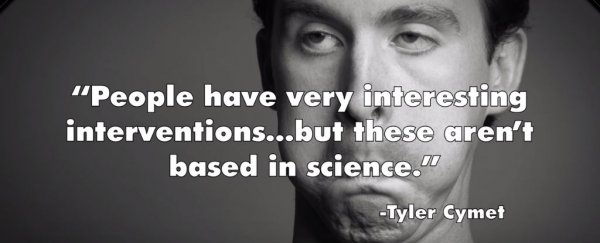
Despite the fact that hiccups are so common, scientists still aren't entirely sure why and how we get them. We know that they likely involve the vagus nerve - a vast network of motor and sensory fibres that feeds into a bunch of organs through the neck and thorax all the way to the abdomen - and the diaphragm, but the complex interactions between our body parts and whatever external stimuli might be causing them is still up for debate. What that means is that all those 'cures' you've heard about and maybe perform religiously could actually be just a bunch of old wives' tales with no real scientific backing.
I say "could", because that's how little we know about hiccups - as Elliott from Mental Floss notes in the video above, there simply hasn't been enough research to confirm the effectiveness of the most common hiccup treatments.
So that old, "hold your breath and count to 10" trick? It's likely all in your head. The American Association of Colleges of Osteopathic Medicine ran a study from 1995 to 2000 testing various hiccup remedies on 54 hospital patients who had the hiccups. Of these remedies, holding your breath was not found to be an effective cure.
The sample size in the experiment was pretty small, but the research team says that not only did the solution not work for the patients they tested, there is very little scientific basis for why it would. As the video explains, while an increase in carbon dioxide could be at play in relieving hiccups, and there has to be a reason for why so many people find this remedy to work for them, scientists have yet to perform a definitive study to figure out the facts behind the correlation.
Related to that, breathing into a paper bag also doesn't have any scientific basis as yet, with a review published by the journal Anesthesia Progress concluding that it falls into the category of treatments that are "anecdotal or are based on dated publications that have failed scientific scrutiny". Ouch.
Scaring someone into losing their hiccups, drinking a lot of water, eating lemon wedges with bitter, acupuncture, hiccup lollipops, and hypnotherapy are all purported 'cures' that have yet to prove themselves when put to a proper scientific test. That doesn't mean they definitely don't work, but until we have proof, you should take all of these with a grain of salt.
What could actually be at play here is that these are all ways to distract you and your body from the fact that you have hiccups, and maybe that distraction is enough to get rid of them.
I'll let Elliott from Mental Floss run through the evidence we do have in the video above, and remember, as long as your chosen method for hiccup recovery doesn't harm you in any way, if it works, keep doing it. It might all be in your head, but whatever works, right?
